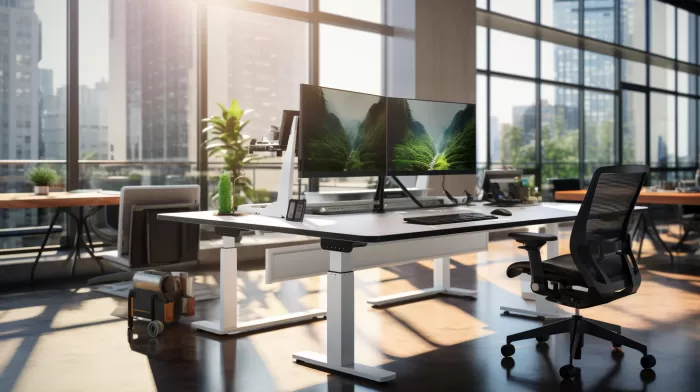Stressful jobs can have a significant negative impact on your physical and mental health. But did you know that making a few changes to your workplace surroundings can greatly improve your overall well-being? Using a walking workstation is one of the effective ways to ease the tension you feel at work, and this article will explore other tips to help you reduce stress and even boost productivity.
Walking Workstations: A Step towards Less Stress
A study conducted at the Department of Psychology in the School of Science at Indiana University-Purdue University Indianapolis found that walking workstations can give psychological and physical benefits no matter your exercise habits or body mass index (BMI). These walking workstations can help not only keep you active during the day, but can also increase satisfaction and involvement at work, reduce boredom and stress, and improve mental focus.
This study examined the feelings and physical health of 180 participants, analyzing their boredom, enthusiasm, job satisfaction, stress levels, mental focus, and performance. Researchers asked the study participants to perform computer tasks related to their jobs in four different types of workstations: seated desk, standing desk, cycling desk, and walking desk. The results indicated that walking workstations yielded the most positive outcomes. Interestingly, the cycling workstation turned out to be a disaster, as it significantly reduced job satisfaction and performance.
Based on these findings, walking workstations are a worthy investment to mitigate work stress; other tips discussed below can further enhance your workplace well-being.
Keep a Clutter-Free Workspace
Having a clean, clutter-free workspace can lower your stress levels and increase your productivity. Clutter in your environment can serve as a constant reminder of tasks that you need to complete or that you have been putting off. Tidying up your workspace can help your mind feel more organized and focused on the tasks that truly matter.
Prioritize Breaks and Movement
Taking short breaks throughout the day can significantly reduce your stress levels and improve your overall well-being. Periodically step away from your desk, take a couple of deep breaths, stretch, and go for a short walk around the office or outside the building. By doing so, you will give your brain a chance to recharge and increase your focus and productivity when you return to work.
Get Your Daily Dose of Fresh Air
Spending time outside during your breaks to get some fresh air and enjoy the sunlight can do wonders for your physical and mental health. Sunlight helps our bodies produce vitamin D and serotonin, both of which are essential for mood regulation. Additionally, fresh air can aid cognitive function, helping you stay more alert and focused at work.
Use Guided Relaxation Techniques
Guided relaxation techniques, such as deep breathing and progressive muscle relaxation, can help you stay calm and reduce stress during your workday. Incorporate these techniques into your daily routine, and you will soon notice a positive impact on your overall mood and well-being.
Connect with Coworkers
Interacting with your coworkers and building positive relationships at work can help alleviate stress and create a more pleasant work environment. Encourage team-building activities and focus on open communication between team members. A strong support network at work can help everyone manage stress more efficiently.
Identify Sources of Stress
Take some time to identify the main sources of stress in your job, then brainstorm possible solutions to reduce or eliminate them. It could be a simple change such as adjusting your work schedule or avoiding multitasking. Implementing these changes can improve your overall mental health and well-being.
Set Boundaries between Work and Life
Establishing proper boundaries between work and personal life can help protect you from the harmful effects of chronic stress. Always make time for your own interests, hobbies, and loved ones. Remember to separate work time and personal time, so you can recharge effectively during your off hours and be more productive during your work hours.
Final Thoughts
Work stress can take a significant toll on your physical and mental health; nevertheless, implementing the various tips suggested in this article can mitigate its effects on your overall well-being. Consider utilizing walking workstations, maintaining a clutter-free space, prioritizing breaks and movement, spending time outdoors, trying out guided relaxation techniques, connecting with coworkers, identifying the significant sources of workplace stress, and establishing proper work-life boundaries. These approaches can create a more balanced and enjoyable work experience while reducing stress and boosting productivity.



